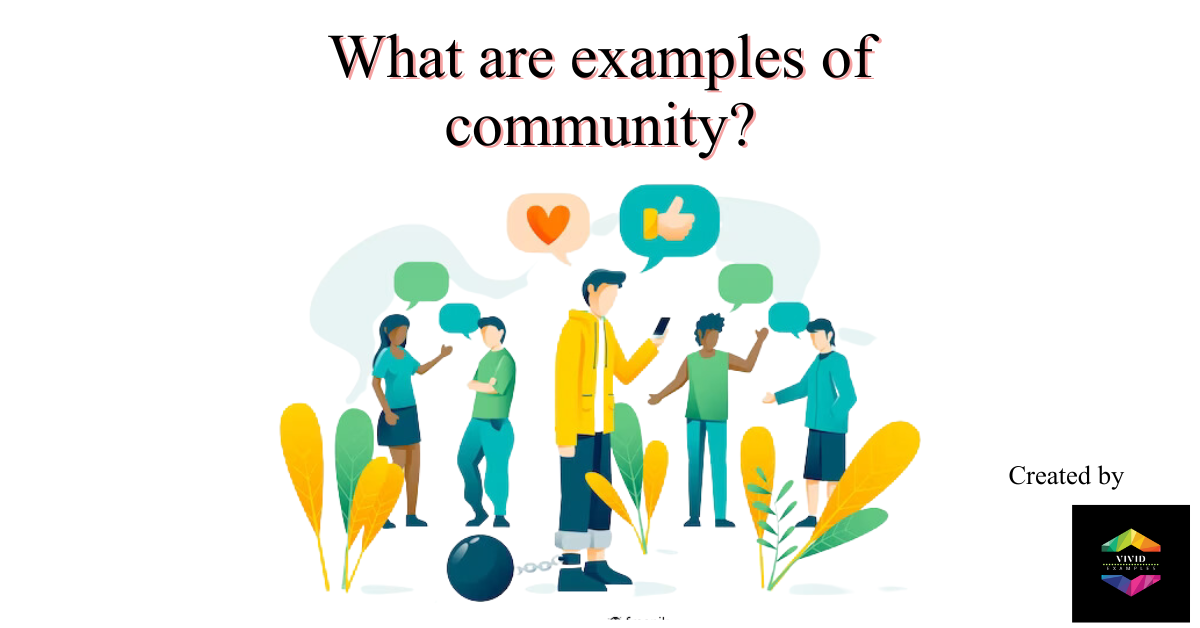Community is an essential aspect of human life that has been present since the early days of civilization. It represents a group of individuals who come together, sharing common interests, values, and goals. The sense of belonging and support provided by a community is crucial for personal growth, societal harmony, and overall well-being. In this article, we will explore various examples of communities, highlighting their significance and impact on individuals and society as a whole.
Significance of Community
Humans are social beings, and our need for community is deeply ingrained. Throughout history, people have formed communities to foster connections, share knowledge, and achieve common objectives. In the modern era, societies have evolved beyond geographic boundaries, thanks to the internet, creating many online communities. Let’s explore some examples of communities that play significant roles in our lives.
Examples of community
Examples of different types of communities are given below,
Online Communities
- Social Media Groups: Social media platforms have revolutionized the way we connect with others. Facebook, Reddit, and LinkedIn are prominent platforms hosting countless groups centered around diverse interests. From cooking enthusiasts to political activists, these communities provide spaces for individuals to engage in discussions, share experiences, and find like-minded individuals worldwide.
- Forums and Discussion: BoardsInternet forums and discussion boards have been a staple of online community building for decades. They cater to niche interests, hobbies, and professional topics. Whether it’s a tech support forum for troubleshooting, a gaming community sharing strategies, or an advice board for relationship discussions, these platforms foster a sense of camaraderie among participants.
- Gaming Communities: The gaming world is home to numerous passionate communities. Gamers come together through multiplayer games, eSports teams, and fan forums to share their love for gaming, compete, and learn from one another. These communities often transcend geographical barriers and bridge cultural differences.
Local Communities
- Neighborhood Associations: Local communities play a crucial role in people’s daily lives. Neighborhood associations organize events, address common concerns, and promote a sense of safety and belonging among residents. They often collaborate on initiatives that enhance the community’s overall quality of life.
- Religious Groups: Religious communities bring together individuals who share faith and spiritual beliefs. These groups participate in religious ceremonies, engage in charitable activities, and provide emotional support to their members during times of joy and sorrow.
- Sports Clubs: Sports communities unite individuals who share a passion for physical activities. Whether it’s a local soccer club or a regional hiking group, these communities encourage healthy lifestyles and create opportunities for individuals to bond through shared activities.

Professional Communities
- Industry Associations: In the business world, industry associations bring together professionals from the same field. These communities facilitate networking, knowledge-sharing, and collective advocacy for industry-related issues. They play a vital role in professional development and staying updated on industry trends.
- Networking Groups: Networking communities enable individuals to connect with peers, mentors, and potential clients or partners. Whether in-person or online, networking communities foster meaningful relationships that can lead to career opportunities and business growth.
- Alumni Networks: Alumni networks connect graduates from educational institutions. These communities serve as platforms for staying in touch, mentoring current students, and accessing job opportunities through fellow alumni.
Cultural Communities
- Ethnic and Heritage: GroupsCultural communities celebrate shared heritage, traditions, and history. They provide a sense of identity and pride to individuals with similar cultural backgrounds, allowing them to maintain and pass down their customs to future generations.
- Artistic and Creative: Circles Artists, writers, musicians, and other creatives form communities to collaborate, inspire one another, and showcase their work. These communities foster artistic growth and serve as platforms for promoting creative endeavors.
- Language Exchange: ClubsLanguage exchange communities bring together individuals seeking to learn and practice new languages. Participants often pair up to practice speaking, writing, and understanding different languages, promoting cross-cultural understanding.
Support Communities
- Mental Health: Support GroupsMental health support communities offer a safe space for individuals to share their experiences, seek advice, and find emotional support. These communities help break the stigma surrounding mental health issues and encourage open dialogue.
- Chronic Illness: Support CommunitiesIndividuals living with chronic illnesses find solace and understanding in support communities. These groups provide valuable information, coping strategies, and empathy to help members navigate the challenges they face.
- Addiction Recovery Groups: Addiction recovery communities aid individuals in their journey to sobriety and a healthier lifestyle. These groups offer encouragement, accountability, and shared experiences to those striving to overcome addiction.
Communities play an indispensable role in shaping our lives, fostering connections, and empowering individuals. From online platforms that transcend geographical boundaries to local groups that strengthen neighborhoods, examples of communities are abundant and diverse. As humans, we thrive on social connections and find comfort in sharing our experiences, interests, and challenges with like-minded individuals. Embracing and participating in communities enriches our lives and creates a sense of belonging in an otherwise vast and complex world.

